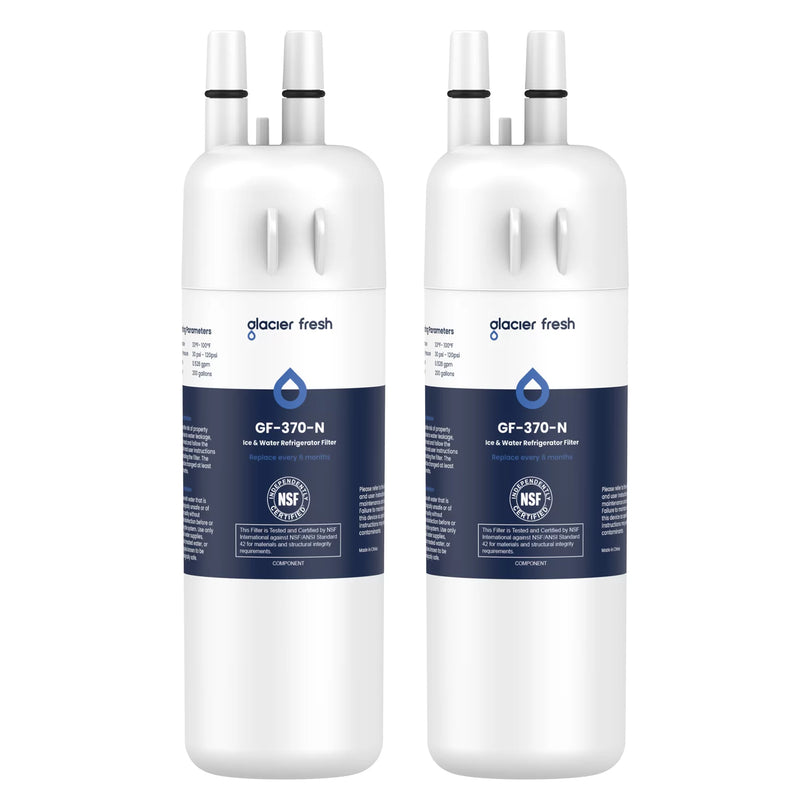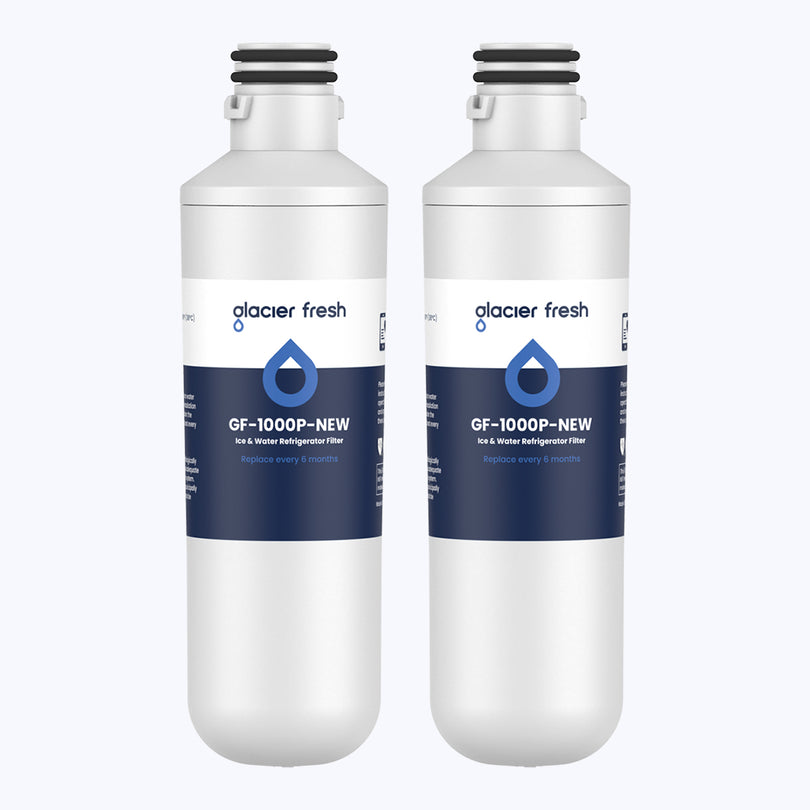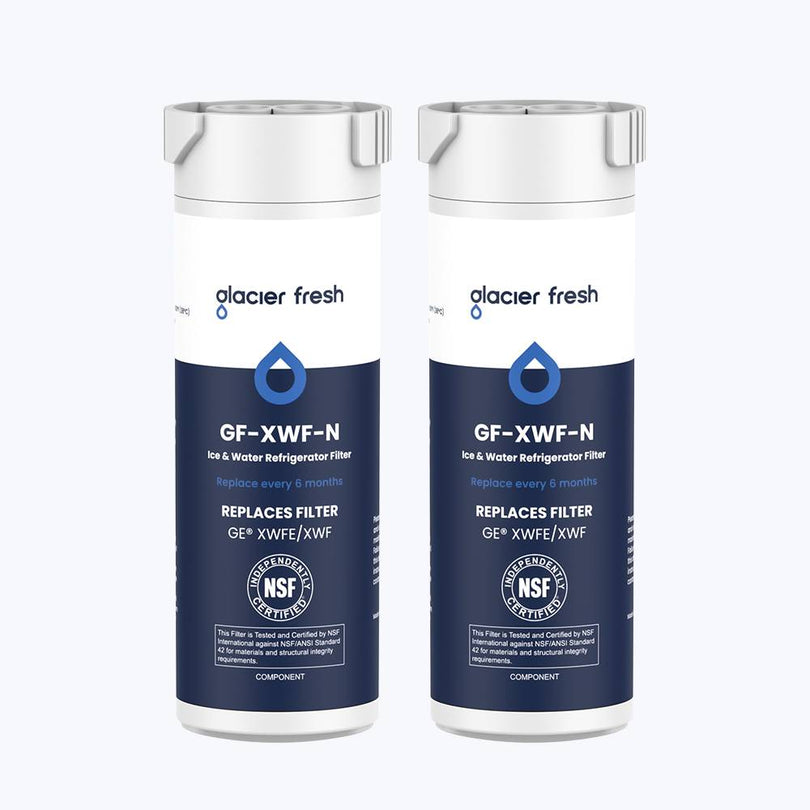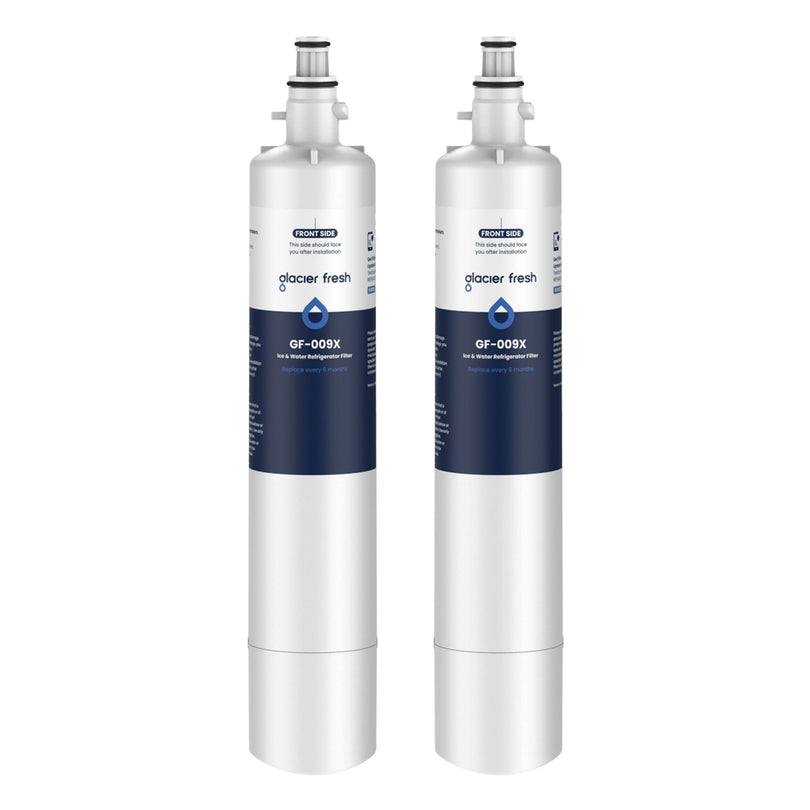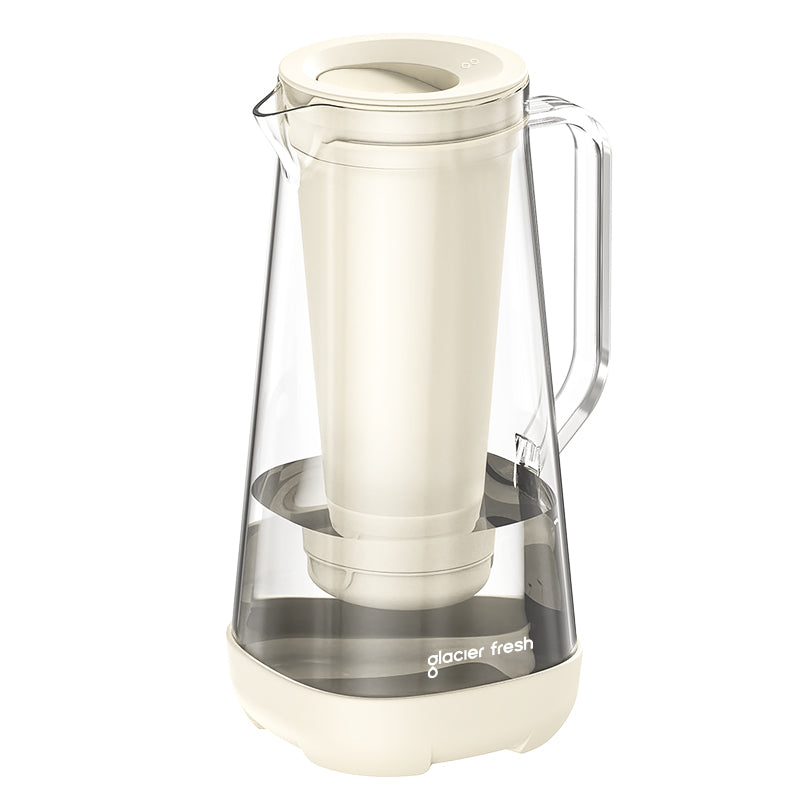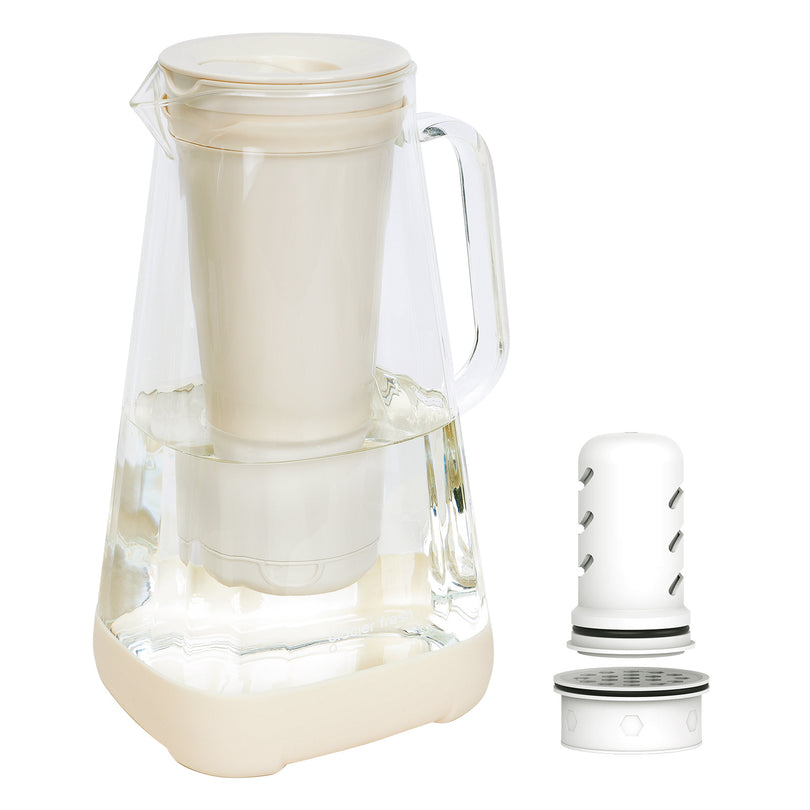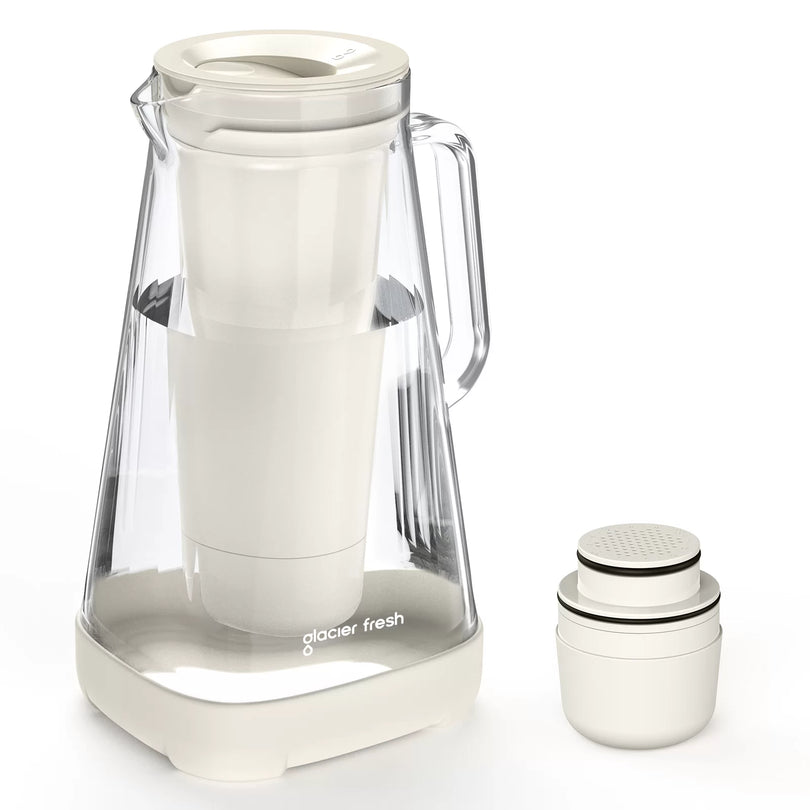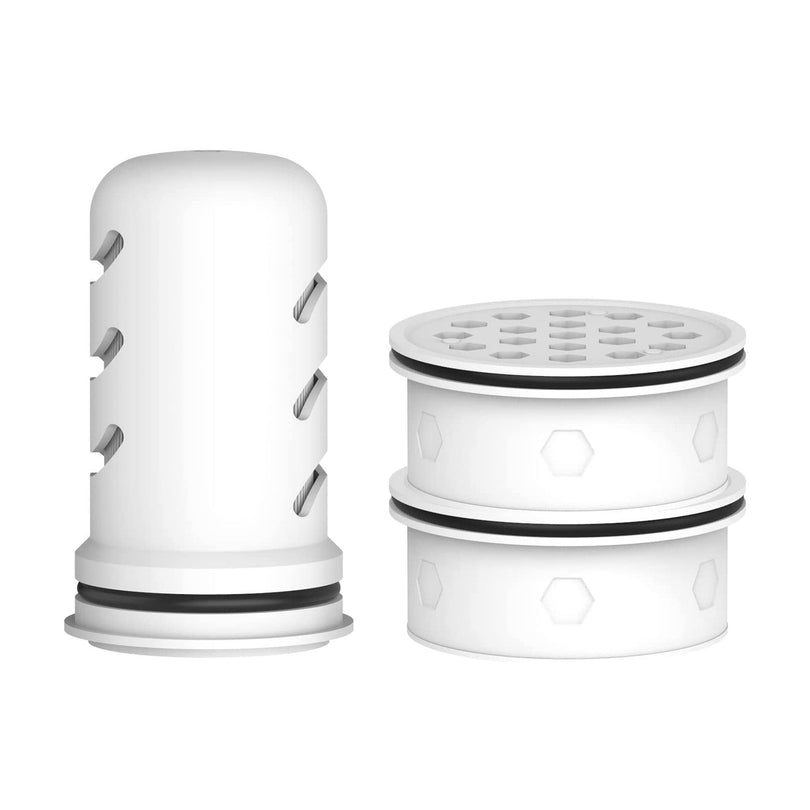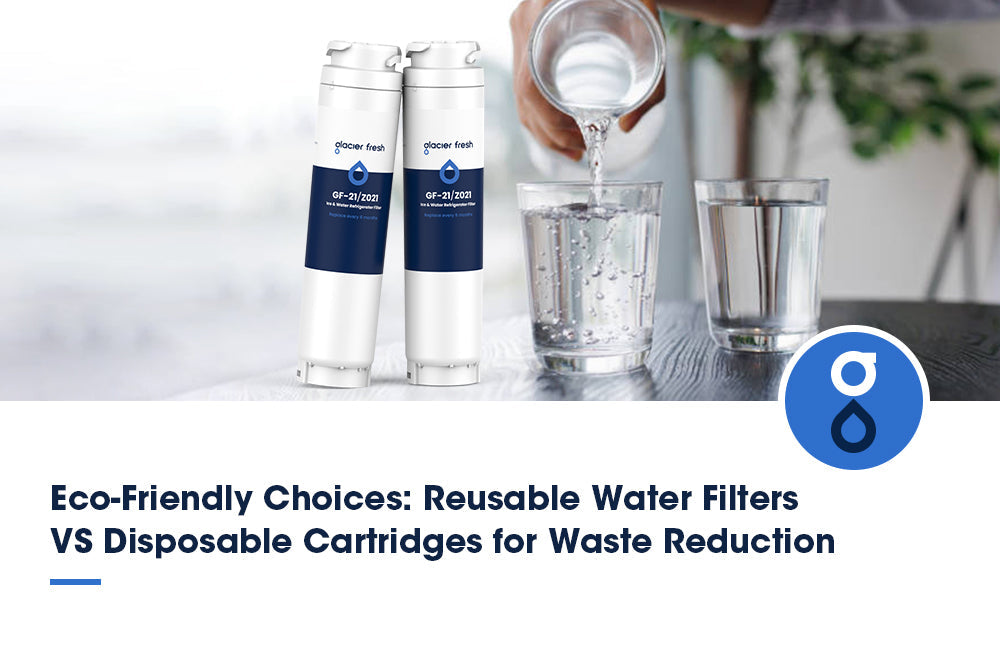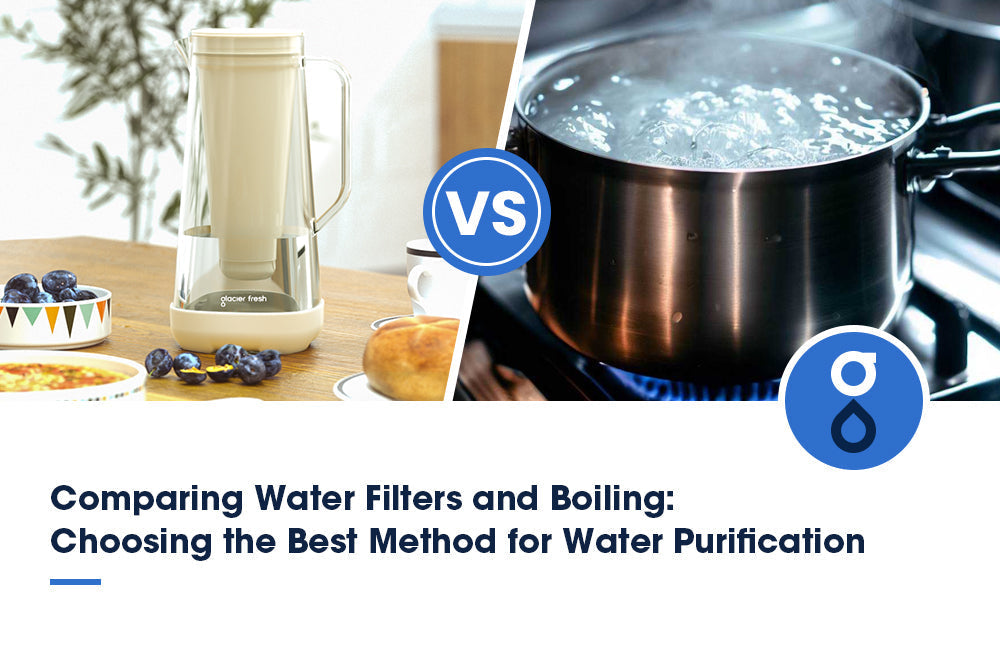Table of Contents:
Was ist ein wiederverwendbarer Wasserfilter?
Wie gut kennen Sie sich mit Einwegkartuschen aus?
Umweltauswirkungen von Einwegkartuschen
Gesundheitliche Aspekte wiederverwendbarer Wasserfilter
Wiederverwendbare Wasserfilter VS Einwegkartuschen: Wer gewinnt?
FAQs
Abschluss
Möchten Sie umweltfreundliche Alternativen wählen und Abfall reduzieren? Haben Sie schon einmal über die Verwendung von wiederverwendbaren Wasserfiltern oder Einwegkartuschen nachgedacht? Diese beiden Optionen haben unterschiedliche Auswirkungen auf die Umwelt und Ihre Gesundheit.
In diesem Artikel befassen wir uns mit den Umweltauswirkungen von Einwegkartuschen und den gesundheitlichen Aspekten wiederverwendbarer Wasserfilter . Letztendlich werden wir entscheiden, welche Option im Kampf zwischen wiederverwendbaren Wasserfiltern und Einwegkartuschen die Nase vorn hat. Tauchen wir also ein und entscheiden wir uns für eine nachhaltigere Zukunft.
Was ist ein wiederverwendbarer Wasserfilter?
Ein wiederverwendbarer Wasserfilter ist ein Gerät, das Sie wiederholt verwenden können, um Verunreinigungen aus Ihrem Trinkwasser zu entfernen. Er ist eine umweltfreundliche Alternative zu Einweg-Wasserfilterkartuschen.
Die Verwendung eines wiederverwendbaren Wasserfilters bietet mehrere Vorteile. Erstens ist er auf lange Sicht kostengünstiger. Zwar ist die Anfangsinvestition höher, aber Sie sparen Geld, da Sie nicht ständig neue Kartuschen kaufen müssen. Zweitens reduziert er den Abfall, da Sie die Kartuschen nicht nach jedem Gebrauch wegwerfen. Das schont nicht nur die Umwelt, sondern reduziert auch die Menge an Plastikmüll auf Mülldeponien.
Es gibt jedoch auch einige Nachteile, die zu berücksichtigen sind. Ein solcher Nachteil ist die Wartung des Kühlschrank-Wasserfilters . Wiederverwendbare Wasserfilter erfordern regelmäßige Reinigung und Austausch des Filtermediums, um eine optimale Leistung zu gewährleisten. Dies kann zeitaufwändig sein und zusätzliche Ressourcen erfordern. Darüber hinaus können wiederverwendbare Filter je nach Modell und verwendeter Technologie bestimmte Verunreinigungen weniger effektiv entfernen als Einwegfilter.
Wie gut kennen Sie sich mit Einwegkartuschen aus?
Einwegkartuschen werden häufig in Wasserfiltern verwendet, um Verunreinigungen zu entfernen und den Geschmack des Leitungswassers zu verbessern. Sie haben jedoch auch einige Nachteile, die Sie kennen sollten.
Einer der Hauptnachteile von Einwegkartuschen ist ihre Umweltbelastung. Diese Kartuschen tragen zur Abfallmenge bei, da sie nach Gebrauch entsorgt werden. Glücklicherweise gibt es Alternativen, die zur Abfallreduzierung beitragen können. Wiederverwendbare Wasserfilter sind eine umweltfreundliche Alternative, da sie Einwegkartuschen überflüssig machen.
Neben den Umweltvorteilen können Mehrwegfilter auch langfristig kostengünstig sein. Zwar sind die Anschaffungskosten eines Mehrwegfilters höher als die einer Einwegkartusche, dafür kann der Mehrwegfilter aber länger verwendet werden, ohne dass er häufig ausgetauscht werden muss. Dies kann im Laufe der Zeit zu erheblichen Kosteneinsparungen führen.
Umweltauswirkungen von Einwegkartuschen
Plastikverschmutzung und Abfallproduktion
Durch den Einsatz wiederverwendbarer Wasserfilter anstelle von Einwegkartuschen wird die Plastikverschmutzung und die Abfallproduktion reduziert.
Die Reduzierung von Plastikmüll ist heutzutage ein dringendes Problem. Daher ist es wichtig, nachhaltige Alternativen zu finden, die die Umweltbelastung minimieren. Einwegkartuschen tragen erheblich zur Plastikverschmutzung bei, da sie in der Regel aus Einwegkunststoffen hergestellt werden. Diese Kartuschen werden nur für eine begrenzte Zeit verwendet und dann entsorgt. Sie landen oft auf Mülldeponien oder verschmutzen Gewässer.
Die Herstellung und Entsorgung dieser Kartuschen führt zu einem Teufelskreis der Plastikmüllansammlung. Mit wiederverwendbaren Wasserfiltern können Sie die Menge des entstehenden Plastikmülls deutlich reduzieren. Wiederverwendbare Filter sind für die mehrfache Verwendung konzipiert, wodurch ein häufiger Kartuschenwechsel entfällt und letztendlich die Plastikverschmutzung und die Müllproduktion reduziert werden.
CO2-Fußabdruck durch den Versand von Einwegkunststoffen
Indem Sie wiederverwendbare Kühlschrank-Wasserfilter anstelle von Einwegfiltern wählen, können Sie auch den CO2-Fußabdruck reduzieren, der durch den Versand von Einwegkunststoffen entsteht. So geht's:
- Emissionen durch den Versand: Der Versand von Einwegkunststoffen trägt zu den Treibhausgasemissionen bei, da die Transportmethoden oft auf fossilen Brennstoffen basieren. Wiederverwendbare Wasserfilter hingegen können schnell einmal versendet und mehrfach verwendet werden, wodurch der Bedarf an häufigen Transporten reduziert wird.
- Alternativen zu Einwegplastik: Wiederverwendbare Wasserfilter bieten eine umweltfreundliche Alternative zu Einwegkartuschen. Durch die Investition in einen wiederverwendbaren Filter entfällt der regelmäßige Kartuschenwechsel, wodurch die Nachfrage nach Einwegplastik reduziert wird.
- Nachhaltige Verpackung: Viele wiederverwendbare Wasserfilter, beispielsweise aus recycelbaren oder biologisch abbaubaren Materialien, werden in einer nachhaltigen Verpackung geliefert. Dies trägt dazu bei, die Umweltbelastung durch Verpackungsmüll und -entsorgung weiter zu reduzieren.
Deponieabfälle mit Einwegkartuschen
Einwegkartuschen tragen zum Deponiemüll bei und haben erhebliche Auswirkungen auf die Umwelt. Diese Einwegkartuschen bestehen oft aus Kunststoff und sind nicht biologisch abbaubar, was zu einer langfristigen Ansammlung auf Deponien führt. Die Entsorgung dieser Kartuschen trägt zu den bereits enormen Abfallmengen bei, die weltweit anfallen. Es gibt jedoch nachhaltige Alternativen und umweltfreundliche Optionen, um den Deponiemüll zu reduzieren. Wiederverwendbare Wasserfilter beispielsweise machen Einwegkartuschen überflüssig. Die Verwendung eines wiederverwendbaren Filters kann Ihren Beitrag zum Deponiemüll erheblich reduzieren und einen nachhaltigeren Lebensstil fördern. Die Investition in umweltfreundliche Optionen wie wiederverwendbare Wasserfilter trägt dazu bei, Deponiemüll zu reduzieren und eine sauberere und gesündere Umwelt für zukünftige Generationen zu gewährleisten.
Gesundheitliche Aspekte wiederverwendbarer Wasserfilter
Aus gesundheitlicher Sicht bieten wiederverwendbare Wasserfilter mehrere Vorteile.
Sicheres Trinkwasser durch regelmäßige Wartung und Reinigung
Sorgen Sie für die Sicherheit Ihres Trinkwassers, indem Sie Ihren wiederverwendbaren Wasserfilter regelmäßig warten und reinigen. Die richtige Pflege Ihres Filters ermöglicht Ihnen und Ihrer Familie sauberes und sicheres Wasser. Hier sind einige wichtige Schritte, die Sie beachten sollten:
Regelmäßige Wartung :
- Befolgen Sie die Anweisungen des Herstellers zum Filterwechsel und zu den Wartungsplänen.
- Überprüfen Sie den Filter regelmäßig auf Anzeichen von Beschädigung oder Verschleiß.
- Um die Wirksamkeit des Filters aufrechtzuerhalten, ersetzen Sie abgenutzte Teile umgehend.
Reinigung :
- Spülen Sie den Filter nach jedem Gebrauch mit sauberem Wasser aus, um Ablagerungen oder Verunreinigungen zu entfernen.
Verwenden Sie ein mildes Reinigungsmittel und eine weiche Bürste, um den Filter zu schrubben und hartnäckige Rückstände vorsichtig zu entfernen. - Spülen Sie den Filter gründlich aus, um sicherzustellen, dass alle Reinigungsmittel vollständig entfernt werden.
Diese Schritte tragen dazu bei, dass Ihr wiederverwendbarer Wasserfilter sicheres und sauberes Trinkwasser liefert.
Vermeidung schädlicher Chemikalien aus Plastikflaschen oder Leitungswasser
Wählen Sie einen wiederverwendbaren Wasserfilter anstelle von Einwegkartuschen, um Ihre Gesundheit zu schützen und schädliche Chemikalien zu vermeiden. Schädliche Chemikalien können aus Plastikflaschen oder Leitungswasser ins Wasser gelangen und ernsthafte Gesundheitsrisiken bergen. Die Verwendung eines wiederverwendbaren Wasserfilters stellt sicher, dass Ihr Trinkwasser frei von diesen schädlichen Chemikalien ist.
Diese Wahl kommt nicht nur Ihrer Gesundheit zugute, sondern trägt auch dazu bei, die Plastikverschmutzung und Ihren CO2-Fußabdruck zu reduzieren. Einwegkartuschen hingegen tragen zum Plastikmüll bei und müssen ständig ausgetauscht werden, was zu weiteren Umweltschäden führt. Mit einem wiederverwendbaren Wasserfilter können Sie beruhigt sein, denn Sie treffen eine gesündere Wahl für sich und den Planeten.
Schwermetallentfernung in wiederverwendbaren Filtern aus gesundheitlichen Gründen
Die regelmäßige Verwendung eines wiederverwendbaren Wasserfilters entfernt Schwermetalle effektiv aus Ihrem Trinkwasser und sichert so Ihre Gesundheit und Ihr Wohlbefinden. Schwermetallverunreinigungen im Wasser können ernsthafte Gesundheitsrisiken wie Bleivergiftung, Nierenschäden und neurologische Störungen bergen. Die richtige Filterwartung ist entscheidend, um diese Risiken zu minimieren und die Wirksamkeit Ihres wiederverwendbaren Filters zu erhalten. Hier sind einige wichtige Punkte, die Sie beachten sollten:
- Reinigen und ersetzen Sie die Filterkartuschen regelmäßig gemäß den Anweisungen des Herstellers.
- Überprüfen Sie die Filterkomponenten auf Anzeichen von Verschleiß oder Beschädigung und ersetzen Sie sie bei Bedarf.
- Überwachen Sie die Leistung des Filters, indem Sie das gefilterte Wasser regelmäßig auf Schwermetallwerte testen.
- Informieren Sie sich über mögliche Schwermetallquellen in Ihrer Wasserversorgung, beispielsweise alte Rohrleitungen oder Industrieaktivitäten in der Nähe.
Wiederverwendbare Wasserfilter VS Einwegkartuschen: Wer gewinnt?

Die Wahl zwischen wiederverwendbaren Wasserfiltern und Einwegkartuschen zur Abfallreduzierung kann schwierig sein. Beide Optionen haben ihre Vor- und Nachteile, die letztlich von persönlichen Vorlieben und Prioritäten abhängen. Um Ihnen eine fundierte Entscheidung zu ermöglichen, vergleichen wir die beiden Optionen hinsichtlich der Vorteile wiederverwendbarer Wasserfilter, der Kosten und der Verbraucherpräferenzen.
Vorteile wiederverwendbarer Wasserfilter
Wiederverwendbare Wasserfilter erfreuen sich aufgrund ihrer Umweltfreundlichkeit zunehmender Beliebtheit. Sie sind auf eine lange Lebensdauer ausgelegt und müssen daher seltener ausgetauscht werden. Das reduziert nicht nur den Abfall, sondern spart langfristig auch Geld. Wiederverwendbare Filter verfügen zudem oft über mehrere Filterstufen, die die Entfernung von Verunreinigungen gewährleisten und für sauberes und sicheres Trinkwasser sorgen.
Kostenvergleich
Einwegkartuschen erscheinen zwar preislich günstiger, steigen jedoch mit der Zeit an, da sie ständig neue Kartuschen erfordern. Wiederverwendbare Wasserfilter hingegen erfordern zwar eine höhere Anfangsinvestition, erweisen sich aber langfristig als kostengünstiger.
Verbraucherpräferenzen
Die Präferenzen der Verbraucher spielen bei der Entscheidungsfindung eine wichtige Rolle. Manche legen Wert auf Komfort und bevorzugen die Einfachheit von Einwegkartuschen. Andere legen Wert auf Nachhaltigkeit und entscheiden sich für wiederverwendbare Filter, um Abfall zu minimieren. Es ist wichtig, Ihre Prioritäten zu berücksichtigen und die Option zu wählen, die Ihren Werten und Ihrem Lebensstil entspricht.
FAQs
Können Einwegkartuschen recycelt werden?
Um Abfall zu reduzieren, können Sie Einwegkartuschen recyceln. Recyclingoptionen für diese Kartuschen bieten eine alternative Lösung zur Entsorgung und minimieren die Auswirkungen auf die Abfallwirtschaft. Recyclingmethoden wie die kontaktlose Abholung, Rücknahmeprogramme von Einzelhändlern und Recyclingprogramme per Post sind gute Möglichkeiten, Einwegkartuschen zu recyceln.
Gibt es staatliche Vorschriften oder Standards zur Abfallreduzierung bei der Wasserfiltration?
Um die Abfallreduzierung bei der Wasserfiltration zu gewährleisten, wurden staatliche Vorschriften und Standards erlassen. Diese Vorschriften zielen darauf ab, die Umweltauswirkungen von Wasserfiltrationssystemen durch die Förderung nachhaltiger Praktiken und Maßnahmen zur Abfallreduzierung zu minimieren.
Eine der wichtigsten Vorschriften ist die Verpflichtung von Wasserfilterunternehmen, Recyclingprogramme für ihre Einwegkartuschen einzuführen. Dies ermutigt Verbraucher, gebrauchte Kartuschen ordnungsgemäß zu entsorgen und stellt sicher, dass sie recycelt werden und nicht auf Mülldeponien landen.
Abschluss
Wenn Sie sich also zwischen wiederverwendbaren Wasserfiltern und Einwegkartuschen zur Abfallreduzierung entscheiden müssen, ist klar, dass wiederverwendbare Wasserfilter die beste Wahl sind. Sie tragen nicht nur zur Umweltschonung bei, da Einwegkartuschen überflüssig werden, sondern bieten auch gesundheitliche Vorteile, indem sie schädliche Verunreinigungen aus Ihrem Trinkwasser entfernen.
Indem Sie sich für die umweltfreundliche Verwendung eines wiederverwendbaren Wasserfilters mit Glacier Fresh entscheiden, können Sie zu einem gesünderen Planeten und einem gesünderen Menschen beitragen.

